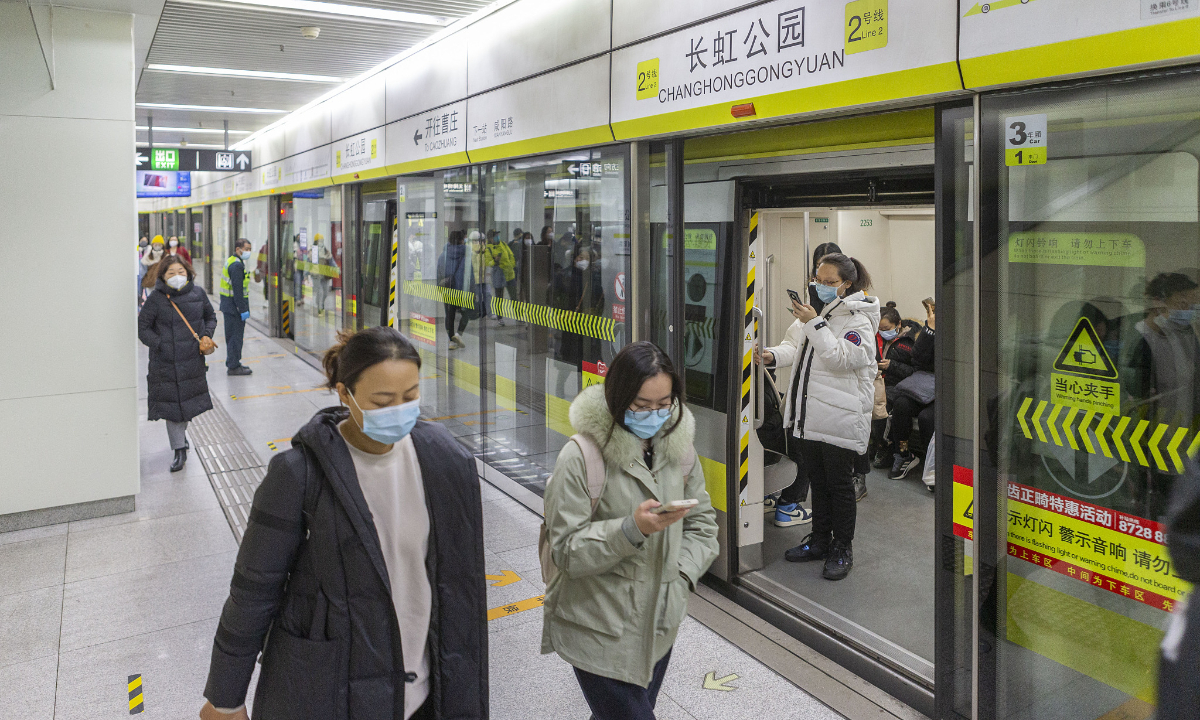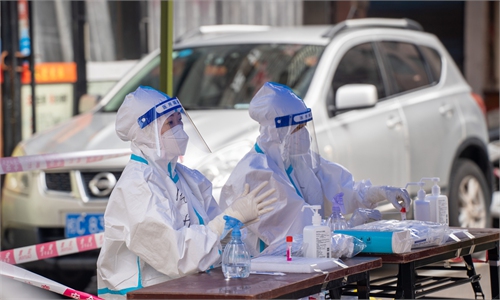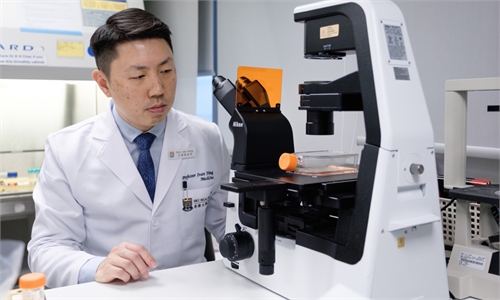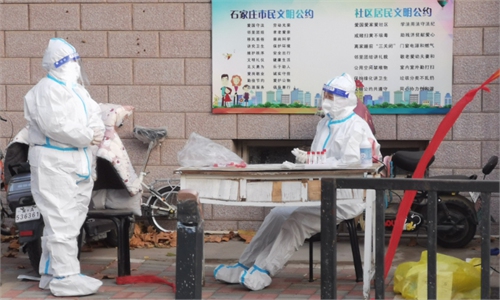Multiple cities ease requirements for COVID-19 testing, as residents start to stockpile self-test kits

Passengers at a subway station in Tianjian. Photo:VCG
At least 10 major Chinese cities have announced the ending of requirements for the checking of 48-hour valid COVID-19 test results for riding public transport. Some cities have also ended testing requirements for entering public venues as many localities continued to optimize their epidemic responses over the weekend.
Cities adjusting policies include Chengdu, Tianjin, Dalian, Shijiazhuang and Shenzhen.
Shenzhen, the technology and manufacturing hub in South China's Guangdong Province, issued a statement early Saturday, confirming that residents will no longer need to provide nucleic acid test certificates when entering public places such as pharmacies, parks, and outdoor tourist attractions, as well as taking public transports, but will still need to scan a venue code to check in, and show their green health code. Residents will still need to show nucleic acid test results when visiting farmer's markets.
The megacity Guangzhou has also lifted a number of restrictions, including ending test result requirements for pharmacies.
Other cities such as Chengdu announced adjustments, in which nucleic acid test results are no longer needed when taking public transport. Meanwhile, the Beijing government said that service operators of buses and subways shall not refuse passengers without a 48-hour negative result, starting next Monday.
Experts contacted by the Global Times applauded the updated approach.
Yang Zhanqiu, a professor from the pathogen biology department at Wuhan University, told the Global Times that regular nucleic acid testing is only suitable for special areas and groups of people with high risks of infection, otherwise it would be deemed excessive and not conforming to the latest scientific epidemic prevention requirements.
As Guangzhou gradually works toward easing epidemic controls, local industries are also in preparation for a full resumption. As of Saturday, nearly 7,700 key enterprises above designated size, 18,000 catering units, 219,000 wholesale and retail enterprises, and 122 industrial parks in Tianhe district of Guangzhou have all resumed work and production, Huang Kaixuan, executive deputy head of Tianhe district, said at a press conference on epidemic prevention and control on Saturday.
Moreover, a number of shopping malls in Beijing have reopened on Saturday, although in-store dining remains suspended at many restaurants, with only pickup and takeaway available.
As of 3 pm on Saturday, there were 1,392 newly reported local COVID-19 cases in Beijing, a decrease of about 20 percent compared with the 1,738 cases in the same time period on Friday.
In the face of easing epidemic restrictions, online rumors emerged claiming that Beijing would "fully lift epidemic restrictions from tomorrow, ending social nucleic acid and health codes," which the Beijing Center for Disease Prevention and Control swiftly denied. While the overall situation of the epidemic in Beijing is stable and slowing down, community spread remains at a high level and should not be taken lightly, according to media reports.
Beijing's health commission on Friday urged residents to fulfil their duty in preventing COVID-19, and "be the first person responsible for your own health," a phrase used by the local government after the release of the State Council's optimized COVID-19 response measures.
Meanwhile, the Guangzhou health commission had stated that they are adopting different nucleic acid testing strategies for different groups of people while encouraging families to buy their own antigen kits.
The easing of nucleic acid testing partially contributed to the booming demand for medical supplies including antigen detection kits as some residents began to stockpile the supplies, several industry insiders told the Global Times.
An employee of Jianning pharmacy in Guangzhou told the Global Times on Saturday that the antigen detection kits have been sold out and it will take at least two to three days to get new products delivered back on shelf. The store serves individual customers only.
"Since many of the city services no longer require nucleic acid tests, people are rushing to buy antigen detection kits, causing the tightened market supplies," the employee said.
The Guangzhou Market Supervision and Administration Bureau stated that since the adjustment and optimization of the epidemic prevention and control measures on November 30, there has been a phenomenon of citizens rushing to buy medicines in Guangzhou.
The local market regulators are working on guaranteeing supply and stabilizing the prices.
At present, the maximum production capacity of the antigen kits in Guangzhou is about 10.5 million doses per day, and manufacturers in the city have insisted on not raising prices as they rush to meet the demand and do their best to stabilize production and ensure supply, according to media reports.
The easing epidemic control measures are also driving up demand for certain drugs as people take more responsibility for their health. The Beijing Municipal Market Supervision Administration stated on Saturday that residents will no longer need to go through identification check when purchasing medicines for fever, cough, infection, and dry and sore throat.



